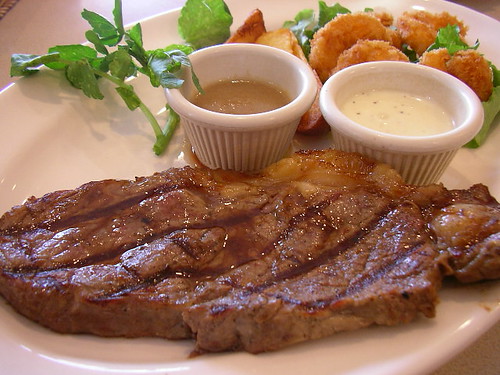Low-Carb vs. Low-Fat: Effects on Weight Loss and Cholesterol in Overweight Men
These days pretty much everyone knows that the easiest way to lose weight is to cut down on carbohydrates. The reason why the Atkins diet is so popular is because it works. Since, however, the rest of the effects of a low-carb diet on health markers are less clear, it's worthwhile to look at some of things that happen in the body when you reduce your carb intake.
I think warning against low-fat diets on a health blog is sort of preaching to the choir, but if there's still someone out there contemplating whether to eat less fats or carbohydrates, this study by Sharman et al. is for you. The authors put overweight men on a 6-week low-fat diet and a 6-week very low-carbohydrate diet and looked at changes in their lipid levels.
Study participants and diet composition
The participants were 15 overweight but otherwise healthy men with body fat percentages over 25%. Mean age was 33.2, and mean BMI was 34.3. Fat intake before the two diet experiments was 29-42% of total energy. The participants were randomly divided into two groups, with one following the low-fat diet for 6 weeks and then the low-carb diet for 6 weeks, and the other group doing the same but in reverse order.
The low-fat diet was composed of ~20% protein, ~25% fat, and ~55% carbohydrates (of total energy intake). It also contained less than 10% of total calories as saturated fat, which should make the bacon-fearing food pyramid folks more than happy.
The low-carb diet, on the other hand, was composed of ~30% protein, ~60% fat, and ~10% carbohydrates. There were no restrictions on the type of fat consumed. Foods most commonly consumed on this diet included beef, poultry, fish, oils, nuts, seeds, and peanut butter. Vegetables, salads, cheese, eggs, and protein powder were eaten in moderation. All the subjects were in ketosis throughout the low-carb diet period, as confirmed by urine samples (mean carbohydrate intake was only 36 grams).
Weight loss
Before the experiments, mean energy intake was ~2590 kcal daily. During the 6-week low-fat diet, energy intake was reduced to ~1560 kcal daily. As a result, participants lost 3.9 kg on average. During the low-carb diet, energy intake was ~1860 kcal, but the subjects actually lost more weight as a result, with average loss during this period being 6.1 kg (I wonder how the "a calorie is a calorie" folks are going explain that one!)
Insulin levels
Serum insulin and insulin resistance were reduced to the same extent (~40% and ~30%, respectively) by both diets. This was probably mostly due to eating less, especially on the low-fat diet. I suspect that if their energy intake had been higher, insulin levels would've been better during the low-carb diet than the low-fat diet.
Cholesterol levels
Total cholesterol was reduced by 15% during the low-fat diet and by 11% during the low-carb diet, with no difference in the extent of the decrease. LDL was significantly reduced only by the low-fat diet. HDL was not affected. Triglycerides and the ratio of triglycerides to HDL were reduced only by the low-carb diet, with decreases of 44% and 42%, respectively. Pretty impressive figures.
Lipoprotein fractions did not change significantly on the low-fat diet. However, during the low-carb diet, relative percentages and concentration of the larger LDL-1 fraction increased and those of the smaller LDL-3 and LDL-4 particles decreased. Similarly, VLDL levels did not change during the low-fat diet but decreased during the low-carb diet.
Since triglyceride levels, VLDL levels, and the size of the LDL particles (smaller being worse) area lot more important than total cholesterol or LDL in determining cardiovascular disease risk, low-carb clearly performed better here than the low-fat diet.
Conclusion
In a balanced, randomized, cross-over study comparing two 6-week hypocaloric diets, overweight men showed more favourable changes in health markers during the very low-carb diet than the low-fat diet. As the low-carb diet only contained 36 grams of carbohydrates on average, the subjects were in ketosis throughout one of the two 6-week periods.
Despite eating more during the low-carb diet than during the low-fat diet, the subjects lost more weight. Insulin levels were improved during both diets. LDL was reduced only by the low-fat diet, while triglycerides, VLDL and LDL particle size were improved only by the low-carb diet. HDL was unaffected. Since these markers are important in determining cardiovascular risk, very low-carb diets appear safe and more beneficial than low-fat diets in individuals with metabolic syndrome.
For more information on diets and health, see these posts:
Intermittent Fasting with a Condensed Eating Window – Part I: Poorer Insulin Sensitivity and Glucose Tolerance
Anti-Aging in the Media: Houston Press on Caloric Restriction
A Typical Paleolithic High-Fat, Low-Carb Meal of an Intermittent Faster
7 Human Experiments of 2008 – Year in Review









3 kommenttia:
[...]There are plenty of information and tips about the low carb diet recipes. No matter what sources of information or tips you choose you need to always keep in your mind that the low carb diet recipes should consist of healthy and match with your diet plan[...]
The body stores about 800 grams of carbohydrates. It depends on how much muscles you have. One (1) gram of carbohydrates binds 2 grams of water.
What this means is that a person that is carbohydrate depleted should weigh about 2.4 kilos less than when loaded with carbohydrates.
Which this study shows quite well.
Why do they call 25% fat a low-fat diet? 10% carbs is low-carb, why not 10% fat?
Post a Comment